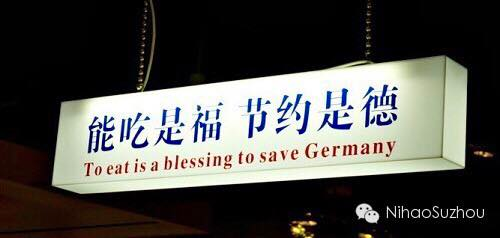Saving Germany, one (Chinese?) meal at a time
« previous post | next post »
Nathan Hopson spotted this on Facebook:

néng chī shì fú 能吃是福 ("to eat is a blessing")
jiéyuē shì dé 节约是德 ("to save is a virtue")
N.B.: The Chinese name for Germany is Déguó 德国 (lit., "virtuous country", but the dé 德 is actually a transcription of the initial sound of "Deutschland".
Nathan comments:
Interesting to me in part because the Japanese abbreviation for Germany is 独, not 徳.
I'm guessing that the machine translation with 独 would have led to equal hilarity along the lines of "To eat is a blessing, so eat less and alone," or "To eat is a blessing. Save money by eating alone."
VHM: doku 独 ("alone") is short for Doitsu ドイツ / 独乙 ("Germany"). Other forms of the name in Japanese are Dokukoku 独 国 (lit., "alone country") and Doichurando ド イチュランド (" Deutschland").
From the interesting Wikipedia article on "Names of Germany":
Japanese language ドイツ (doitsu) is an approximation of the Dutch word duits meaning ‘German’.[18]
It was earlier written with the Sino-Japanese character compound 獨逸 (whose 獨 has since been simplified to 独), but has been largely superseded by the above-mentioned katakana ドイツ. The character 独 is sometimes used in compounds, for example 独文 (dokubun) meaning ‘German literature’, or as an abbreviation, such as in 独日関係 (dokunichi kankei German-Japanese relations?).
I actually posted on this sign before, but am doing so again because Nathan has reacted to it from a Japanese point of view and brought out all sorts of interesting implications.
"To save Germany " (7/14/13)